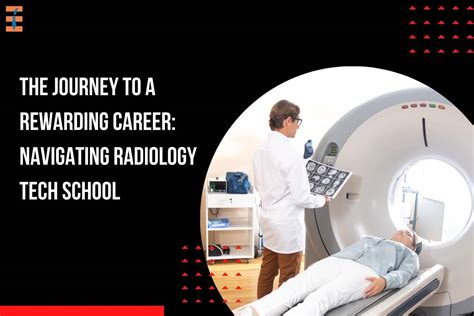As the healthcare industry continues to evolve, the demand for skilled professionals in diagnostic imaging has never been more pressing. Among the various roles that contribute to the smooth functioning of radiology departments, the Radiology Special Procedure Tech (RSPT) stands out as a highly specialized and in-demand profession. In this article, we will delve into the world of RSPTs, exploring the rewards and challenges of this career path, as well as the skills and qualifications required to excel in this field.
The Role of a Radiology Special Procedure Tech
A Radiology Special Procedure Tech is a highly trained professional responsible for assisting radiologists and other medical staff in performing specialized imaging procedures. These procedures often require the use of advanced technology, such as fluoroscopy, ultrasound, and computed tomography (CT) scans. RSPTs play a vital role in ensuring the smooth execution of these procedures, from preparing patients and equipment to monitoring the procedure and providing critical support to the radiology team.
Benefits of a Career as a Radiology Special Procedure Tech
A career as an RSPT offers numerous benefits, including:
- Competitive Salary and Benefits: RSPTs are among the highest-paid allied health professionals, with median salaries ranging from $60,000 to over $100,000 depending on location and experience.
- Job Security and Growth Opportunities: The demand for skilled RSPTs is expected to continue growing, driven by advances in medical technology and an aging population.
- Variety and Challenge: RSPTs work on a wide range of cases, from routine procedures to complex and high-stakes interventions, providing a challenging and engaging work environment.
- Opportunities for Specialization: RSPTs can specialize in specific areas, such as cardiovascular or neurointerventional radiology, allowing for a high degree of autonomy and expertise.

Education and Training Requirements
To become an RSPT, one must complete a formal education program in radiologic technology, typically an associate's degree or a bachelor's degree in radiologic sciences. These programs typically include coursework in subjects such as:
- Radiologic Technology: The principles and practices of radiologic imaging, including radiation safety and patient care.
- Anatomy and Physiology: The study of human anatomy and physiology, including the systems and structures of the body.
- Patient Assessment: The skills and techniques necessary to assess patient needs and provide supportive care.
In addition to formal education, RSPTs must also complete a certification program, such as the Certified Radiologic Technologist (CRT) or the Registered Technologist (RT) credential, offered by the American Registry of Radiologic Technologists (ARRT).
Key Skills and Qualities for Success as an RSPT
To excel as an RSPT, one must possess a unique combination of technical, interpersonal, and critical thinking skills, including:
- Technical Expertise: A strong foundation in radiologic technology and imaging principles.
- Communication Skills: The ability to effectively communicate with patients, radiologists, and other healthcare professionals.
- Critical Thinking: The ability to analyze complex situations and make sound judgments.
- Attention to Detail: A high degree of attention to detail and ability to maintain focus in high-pressure situations.

Career Advancement Opportunities
With experience and additional education, RSPTs can advance to leadership positions or pursue specialized roles, such as:
- Radiology Department Manager: Overseeing the daily operations of a radiology department.
- Education and Training: Teaching and mentoring students and fellow technologists.
- Research and Development: Contributing to the development of new imaging technologies and procedures.
Challenges and Opportunities in the Field of RSPT
As with any profession, there are challenges and opportunities that come with a career as an RSPT. Some of the key challenges include:
- Keeping Up with Technological Advances: The rapid pace of technological innovation in radiology requires RSPTs to continually update their skills and knowledge.
- Maintaining Patient Safety: Ensuring the safety and well-being of patients during procedures.
- Managing Stress and Burnout: The high-pressure environment of a radiology department can take a toll on RSPTs, making stress management and self-care essential.
Despite these challenges, the rewards of a career as an RSPT far outweigh the difficulties. For those who are passionate about healthcare, technology, and patient care, this career path offers a unique and fulfilling opportunity to make a difference in the lives of others.

Conclusion: A Rewarding Career Path Unfolds
In conclusion, a career as a Radiology Special Procedure Tech offers a unique combination of technical expertise, patient care, and career advancement opportunities. For those who are passionate about healthcare and technology, this career path provides a rewarding and challenging environment in which to grow and develop. With the right education, training, and skills, RSPTs can excel in this field, making a positive impact on the lives of patients and contributing to the advancement of medical imaging technology.
Gallery of Radiology Special Procedure Tech






FAQ Section
What is the typical salary range for a Radiology Special Procedure Tech?
+The typical salary range for a Radiology Special Procedure Tech is between $60,000 and $100,000 per year, depending on location and experience.
What are the education and training requirements for a Radiology Special Procedure Tech?
+A Radiology Special Procedure Tech typically requires an associate's degree or a bachelor's degree in radiologic technology, as well as completion of a certification program, such as the Certified Radiologic Technologist (CRT) or the Registered Technologist (RT) credential.
What are the key skills and qualities required for success as a Radiology Special Procedure Tech?
+The key skills and qualities required for success as a Radiology Special Procedure Tech include technical expertise, communication skills, critical thinking, and attention to detail.
